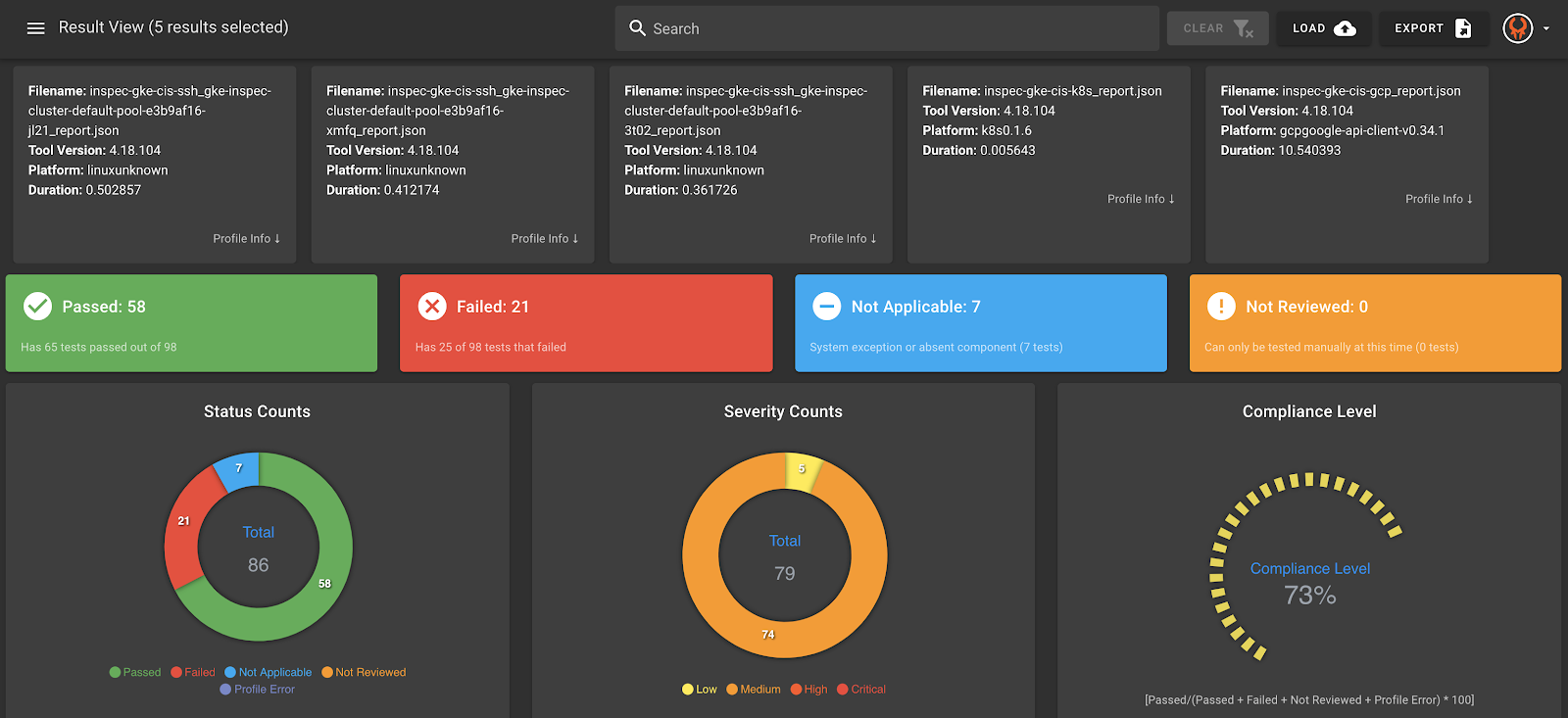Validating security compliance of GKE
GKE is a popular platform to run containerized applications. Many organizations have selected GKE for its scalability, self-healing, observability and integrations with other services on Google Cloud. Developer agility is one of the most compelling arguments for moving to a microservices architecture on Kubernetes, introducing configuration changes at a faster pace and demanding security checks as part of the development lifecycle.Validating the security settings of your GKE cluster is a complex challenge and requires an analysis of multiple layers within your Cloud infrastructure:
GKE is a managed service on GCP, with controls to tweak the cluster’s behaviour which have an impact on its security posture. These Cloud resource configurations can be configured and audited via Infrastructure-as-Code (IaC) frameworks such as Terraform, the gcloud command line or the Google Cloud Console.
Application workloads are deployed on GKE by interacting via the Kubernetes (K8S) API. Kubernetes resources such as pods, deployments and services are often deployed from yaml templates using the command line tool kubectl.
Kubernetes uses configuration files (such as the kube-proxy and kubelet file) typically in yaml format which are stored on the nodes’ file system.
InSpec for auditing GKE
InSpec is a popular DevSecOps framework that checks the configuration state of resources in virtual machines and containers, on Cloud providers such as Google Cloud, AWS, and Microsoft Azure. The InSpec GCP resource pack 1.8 (InSpec-GCP) provides a consistent way to audit GCP resources and can be used to validate the attributes of a GKE cluster against a desired state declared in code. We previously released a blog post on how to validate your Google Cloud resources with InSpec-GCP against compliance profiles such as the CIS 1.1.0 benchmark for GCP.While you can use the InSpec-GCP resource pack to define the InSpec controls to validate resources against the Google Cloud API, it does not directly allow you to validate configurations of other relevant layers such as Kubernetes resources and config files on the nodes. Luckily, the challenge to audit Kubernetes resources with InSpec has already been solved by the inspec-k8s resource pack. Further, files on nodes can be audited using remote access via SSH. All together, we can validate the security posture of GKE holistically using the inspec-gcp and inspec-k8s resource packs as well as controls using the InSpec file resource executed in an ssh session.
Running the CIS for GKE compliance profile with InSpec
With the GKE CIS 1.1.0 Benchmark InSpec Profile we have implemented the security controls to validate a GKE cluster against the recommended settings on GCP resource level, Kubernetes API level and file system level. The repository is split into three profiles (inspec-gke-cis-gcp, inspec-gke-cis-k8s and inspec-gke-cis-ssh), since each profile requires a different “target”, or -t parameter when run using the InSpec command line. For ease of use, a wrapper script run_profiles.sh has been provided in the root directory of the repository with the purpose of running all three profiles and storing the reports in the dedicated folder reports.
The script requires the cluster name (-c), ssh username (-u), private key file for ssh authentication (-k), cluster region or zone (-r or -z) and InSpec input file as required by the inspec.yml files in each profile (-i). As an example, the following line will run all three profiles to validate the compliance of cluster inspec-cluster in zone us-central1-a:
The script requires the cluster name (-c), ssh username (-u), private key file for ssh authentication (-k), cluster region or zone (-r or -z) and InSpec input file as required by the inspec.yml files in each profile (-i). As an example, the following line will run all three profiles to validate the compliance of cluster inspec-cluster in zone us-central1-a:
./run_profiles.sh -c inspec-cluster \
-u konrad \
-k /home/konrad/.ssh/google_compute_engine \
-z us-central1-a \
-i inputs.yml
Running InSpec profile inspec-gke-cis-gcp ...
Profile: InSpec GKE CIS 1.1 Benchmark (inspec-gke-cis-gcp)
Version: 0.1.0
Target: gcp://<service account used for InSpec>
<lots of InSpec output omitted>
Profile Summary: 16 successful controls, 10 control failures, 2 controls skipped
Test Summary: 18 successful, 11 failures, 2 skipped
Stored report in reports/inspec-gke-cis-gcp_report.
Running InSpec profile inspec-gke-cis-k8s …
Profile: InSpec GKE CIS 1.1 Benchmark (inspec-gke-cis-k8s)
Version: 0.1.0
Target: kubernetes://<IP address of K8S endpoint>:443
<lots of InSpec output omitted>
Profile Summary: 9 successful controls, 1 control failure, 0 controls skipped
Test Summary: 9 successful, 1 failure, 0 skipped
Stored report in reports/inspec-gke-cis-gcp_report.
Running InSpec profile inspec-gke-cis-ssh on node <cluster node 1> ...
Profile: InSpec GKE CIS 1.1 Benchmark (inspec-gke-cis-ssh)
Version: 0.1.0
Target: ssh://<username>@<cluster node 1>:22
<lots of InSpec output omitted>
Profile Summary: 10 successful controls, 5 control failures, 1 control skipped
Test Summary: 12 successful, 6 failures, 1 skipped
Stored report in reports/inspec-gke-cis-ssh_<cluster node 1>_report.
Analyze your scan reports
Once the wrapper script has completed successfully you should analyze the JSON or HTML reports to validate the compliance of your GKE cluster. One way to perform the analysis is to upload the collection of JSON reports of a single run from the reports folder to the open source InSpec visualization tool Heimdall Lite (GitHub) by the Mitre Corporation. An example of a compliance dashboard is shown below:Try it yourself and run the GKE CIS 1.1.0 Benchmark InSpec profile in your Google Cloud environment! Clone the repository and follow the CLI example in the Readme file to run the InSpec profiles against your GKE clusters. We also encourage you to report any issues on GitHub that you may find, suggest additional features and to contribute to the project using pull requests. Also, you can read our previous blog post on using InSpec-GCP for compliance validations of your GCP environment.
By Bakh Inamov, Security Specialist Engineer and Konrad Schieban, Infrastructure Cloud Consultant

